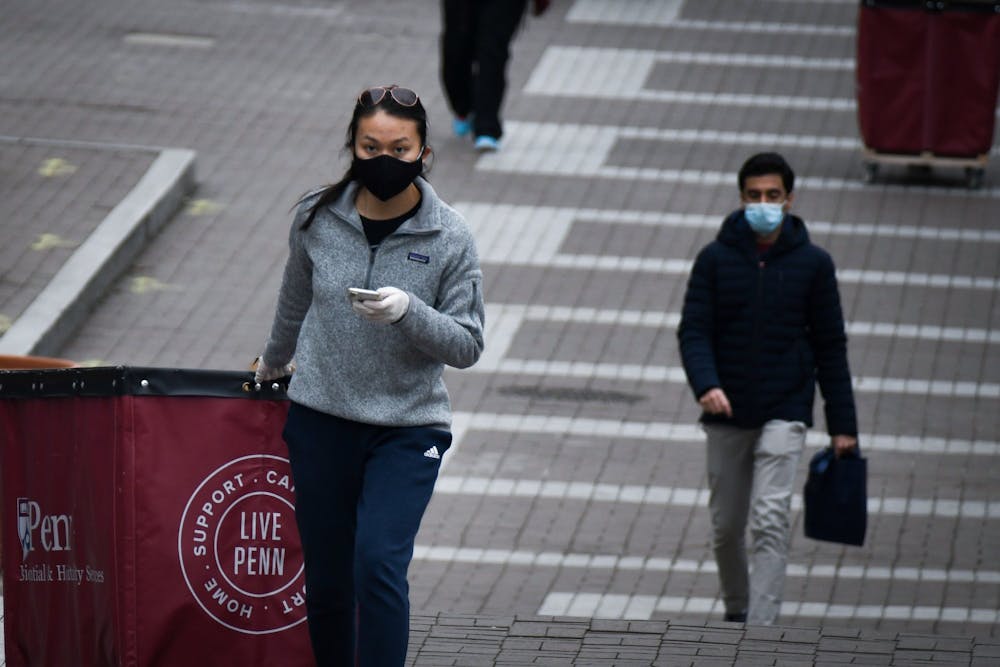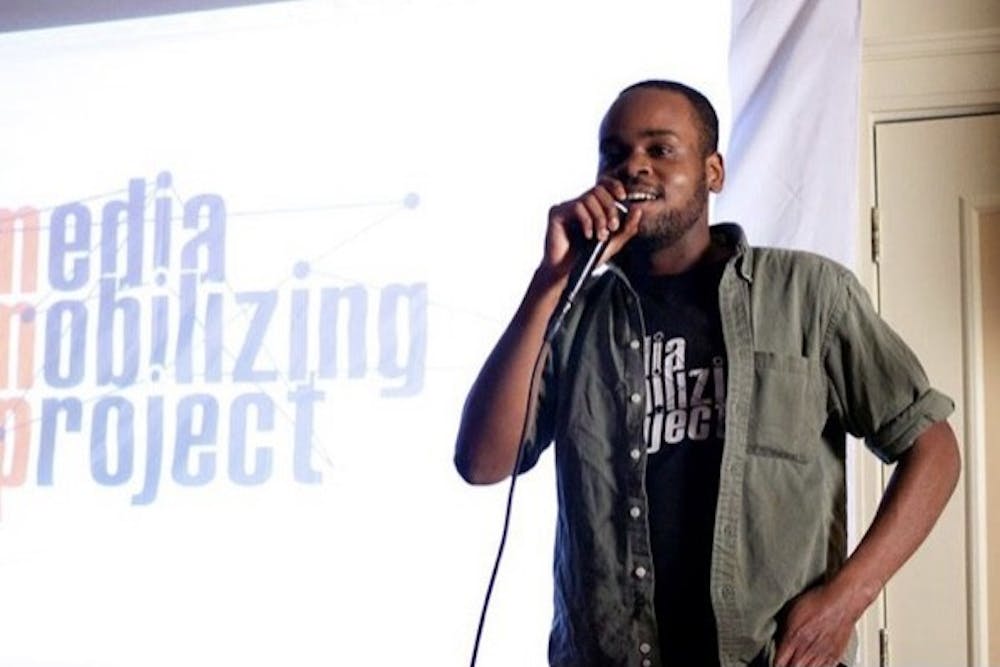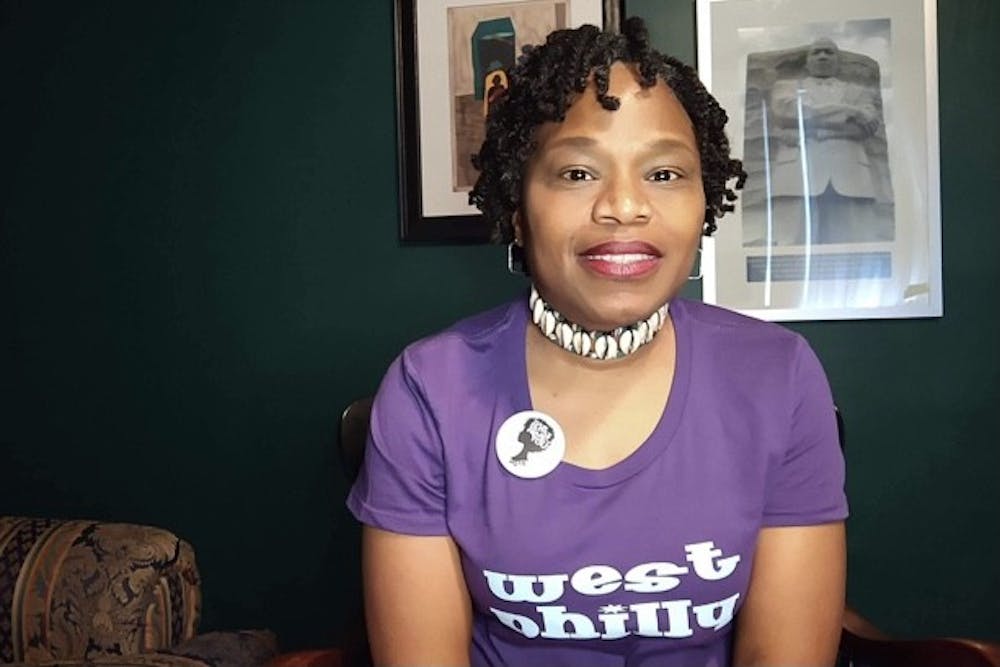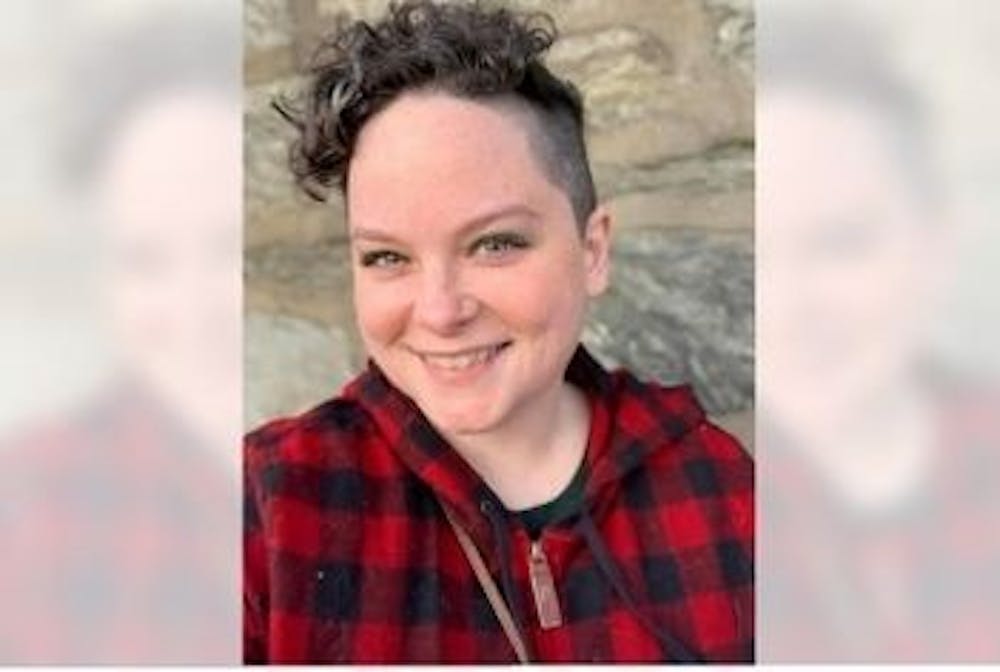
Thousands of Penn students began returning to West Philadelphia on Jan. 10.
Credit: Sukhmani KaurPenn's decision to bring thousands of students back to campus during the pandemic's deadliest season has flung thousands of West Philadelphia residents into increased risk of transmission. After being blindsided by the buzzing campus, members of the local community believe the University made the wrong call.
Bex Hammell, a Philadelphia resident of 15 years who is at high risk for the virus due to Ehlers-Danlos Syndrome, a group of disorders affecting connective tissues, believes that it was “incredibly selfish” and irresponsible of Penn to invite students back to campus.
“Cases are so much higher than in the fall, and the more contagious UK COVID variant just showed up in Philly,” Hammell said. “If they just waited another semester, so many more vulnerable people could be vaccinated.”
The University transitioned to a hybrid model for the spring semester, inviting over 3,000 students back to campus the week of Jan. 10 for the first time since March. According to West Philadelphia residents, the local community was not consulted regarding this decision, which occurred amid ongoing COVID-19 cases that have resulted in over 107,000 cases and 2,800 deaths in the city.
Penn spokesperson Stephen MacCarthy did not respond to a request for comment regarding if the University had contacted or consulted West Philadelphia community members before deciding to reopen campus.
Alex Wiles, a lifetime resident of Philadelphia, said that students should not be on Penn's campus at all, and blames University leadership for endangering its students, staff, as well as the surrounding community.

West Philadelphia resident Alex Wiles (Photo from Alex Wiles)
“They’re being apathetic toward our community,” Wiles said of the decision to bring students back to campus.
He added that “literally the most marginalized people in the entire city who are not homeless” like municipal workers and janitorial staff will be most affected by ongoing COVID-19 cases, which he viewed as the inevitable outcome of Penn's decision.
Wiles does not doubt that cases will rise in West Philadelphia due to having students on campus, and said that this will affect “our Black and brown people, all of our poor people,” who already lack resources like testing sites within their communities. Impacts of the virus have disproportionately affected Philadelphia's Black and Hispanic residents, according to a Pew survey.
“I think it’s irresponsible, and it will literally kill people," Wiles said. “These universities need to think about themselves as a part of a community and not just a self-contained island."
If an outbreak does occur on campus, Hammell is not confident that Penn will be able to prevent it from spreading into the West Philadelphia community, whether through students or University staff who could bring the virus from campus back to their families. Wiles compared the situation to a fire being put out while someone else attempts to light another one nearby.
Hammell also believes students are prone to being irresponsible with following COVID-19 safety guidelines.
“I think that when you’re young and healthy, it’s easy to ignore how dangerous COVID is," Hammell said. "I used to work on campus, and I’ve seen Penn students doing some really foolish things — I mean, I did some ridiculous things when I was that age too. I can’t imagine there won’t be parties and other potential superspreader events."
Wiles believes the University needs accountability for its reckless behavior, He said that actions such as bringing students back on campus during a pandemic can cause generational trauma that severs the trust between itself and the West Philadelphia community, which he said will become harder to fix as time goes on.
Kiasha Huling, a West Philadelphia resident of over four years and admin of the “West Willy” Facebook group for local community members, said that although she did not want students on campus at the moment, both students as well as the University must take precautions to ensure community safety now that thousands of people are back in the area.
“Students are a part of the West Philadelphia community. It’s not the community versus students. And we’re really encouraging students to participate in the community and socially distance, wear their masks, wash their hands, and be considerate of others,” Huling said. “You’re here, so act responsibly and act accordingly."
Neither Huling, Wiles, nor Hammell knew that students would be on campus before being contacted by The Daily Pennsylvanian.
“There’s no consent involved,” Wiles said, adding that he wished Penn had notified the community so that residents would have been able to take protective measures in advance.
Like Wiles, Emma Tramble, who has lived in Philadelphia her entire life, said she was entirely unaware that students were being invited back to campus and wishes that Penn administration had consulted the West Philadelphia community beforehand.

West Philadelphia resident Emma Tramble (Photo from Emma Tramble)
“I wish I had gotten an alert,” she said. “Someone else had told me off-hand and I was like, ‘What?’”
Tramble said that she was frightened when the pandemic first started, as she saw many students not wearing masks and standing in large clusters while walking on campus in March 2020. She added that she and many other local residents were relieved when Penn decided to shut down campus in mid-March.
Despite the increased risk posed to the community, Tramble said that having students back on campus may help prevent the closure of many local restaurants.
While Hammell also acknowledged that local restaurants may benefit from having more Penn students on campus, they said that for most of the West Philadelphia population, having students back on campus may lead to more cases of COVID-19.
But lately, Mohammad Hosain, the owner of Nafi Food Express on Market Street, said that even after his restaurant was closed for five months between March and July of 2020, business has remained slow with just a few Penn students visiting his restaurant each week.
Colleen Moravec, a West Philadelphia resident with severe asthma, has spent most of their time at home since March. Moravec stressed that students need to be mindful of their behavior while on campus, because they are still interacting with the community even if students may be able to quickly recover from COVID-19.

West Philadelphia resident Colleen Moravec (Photo from Colleen Moravec)
“Many of us are high-risk people who could be affected by their decisions,” they said.
Moravec expressed dissatisfaction over how the United States government has handled the pandemic, and said that educational institutions like Penn have acted much in the same way, leaving most choices regarding community health down to personal responsibility.
“When [Penn makes] a decision to bring thousands of students, they need to put guidelines in place and hold students accountable,” Moravec said. “I think it puts students who are being careful in a really tough position too, because they have to share space with students who aren’t being careful. And that’s not their choice.”
Penn has created a Campus Compact, as well as Quiet Period guidelines for students to follow during the first few weeks of the spring term. There has been concerns that students are not taking these guidelines seriously, with first-year students reportedly partying in college houses and breaking Penn's COVID-19 guidelines just days after moving to campus.
Moravec also expressed that they wanted to know the University's plan to vaccinate students, which would make them feel safer knowing that potential cases would not be spread as easily if the school had an adequate plan. Chief Wellness Officer Benoit Dubé told the DP on Jan. 12 that the University does not yet have a plan for distributing the vaccine to students and faculty.
To limit the spread of the virus, Tramble suggested Penn should create a community hotline where residents can alert Penn when they spot students gathering in large groups off campus without masks.
1997 Weitzman graduate Sylvia Palms and 1979 Weitzman graduate Ignacio Bunster, who live about two blocks west of 40th Street close to off-campus student housing, said they have noticed that students living off-campus are generally less careful about following coronavirus safety guidelines.
“I walk around a lot and for the most part they are very cautious about wearing masks but for the students who live behind us, they tend to gather and have parties a lot,” Bunster said. “They are very lax.”
Having two children herself, Palms does not expect Penn students to follow the University's COVID-19 guidelines, especially with restaurants in Philadelphia now allowing indoor dining. If an outbreak occurs on campus, she said she would blame Philadelphia’s local government more than Penn.
“The fact that the city is allowing in-door gathering to happen more so as the virus is increasing as schools are opening back up, it all seems like the perfect storm,” Palms said.
The Daily Pennsylvanian is an independent, student-run newspaper. Please consider making a donation to support the coverage that shapes the University. Your generosity ensures a future of strong journalism at Penn.
Donate







